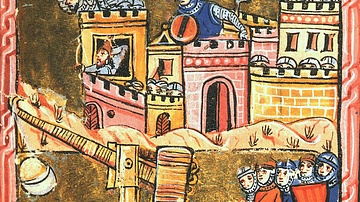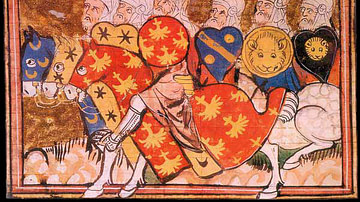Search
Did you mean: Lamia?
Search Results

Article
The Siege of Acre, 1189-91 CE
The Siege of Acre, located on the northern coast of Israel, was the first major battle of the Third Crusade (1189-1192 CE). The protracted siege by a mixed force of European armies against the Muslim garrison and nearby army of Saladin, the...

Article
Ten Should-Be Famous Women of Early Christianity
There were many famous women of early Christianity who made significant contributions to the development of the faith but have since been largely forgotten. Some have been canonized by the Church or recognized in other ways, but their efforts...

Article
Saladin & the Unification of the Muslim Front: 1169-1187 CE
Saladin (c. 1137 – 1193 CE), the Muslim ruler who crushed the mighty Crusader army at the Horns of Hattin (1187 CE) and re-took Jerusalem after 88 years of Crusader control, was born in a world where the disunity of the Muslims had allowed...

Definition
The Medieval Church
Religious practice in medieval Europe (c. 476-1500) was dominated and informed by the Catholic Church. The majority of the population was Christian, and "Christian" at this time meant "Catholic" as there was initially no other form of that...

Image
Map of the Expansion of the Roman Republic (c. 260 - 30 BCE)
This map illustrates the Roman Republic's territorial expansion from approximately 260 to 30 BCE, highlighting how a once-local power in central Italy transformed into a Mediterranean empire. From early campaigns in Sicily and Spain to sweeping...

Image
Map of the Byzantine Empire, c.520 - 1204
This map illustrates the shifting frontiers of the Byzantine Empire from the accession of Justinian I (reign circa 527 - 565) to the Fourth Crusade's sack of Constantinople in 1204, showing how the Greek-speaking eastern Roman state acted...

Definition
Protestant Reformation
The Protestant Reformation (1517-1648) refers to the widespread religious, cultural, and social upheaval of 16th-century Europe that broke the hold of the medieval Church, allowing for the development of personal interpretations of the Christian...

Definition
Martin Luther
Martin Luther (l. 1483-1546) was a German priest, monk, and theologian who became the central figure of the religious and cultural movement known as the Protestant Reformation. Even though earlier reformers had expressed Luther's views, his...

Definition
Roman Army
The Roman army, famed for its discipline, organisation, and innovation in both weapons and tactics, allowed Rome to build and defend a huge empire which for centuries would dominate the Mediterranean world and beyond. Overview The Roman...

Image
The Pull of the Monroe Magnet
The Pull of the Monroe Magnet, illustration by Udo J. Keppler, 1913. In this cartoon depiction of the Monroe Doctrine, a colossal Uncle Sam, a national personification of the United States, forcibly draws toward himself figures representing...